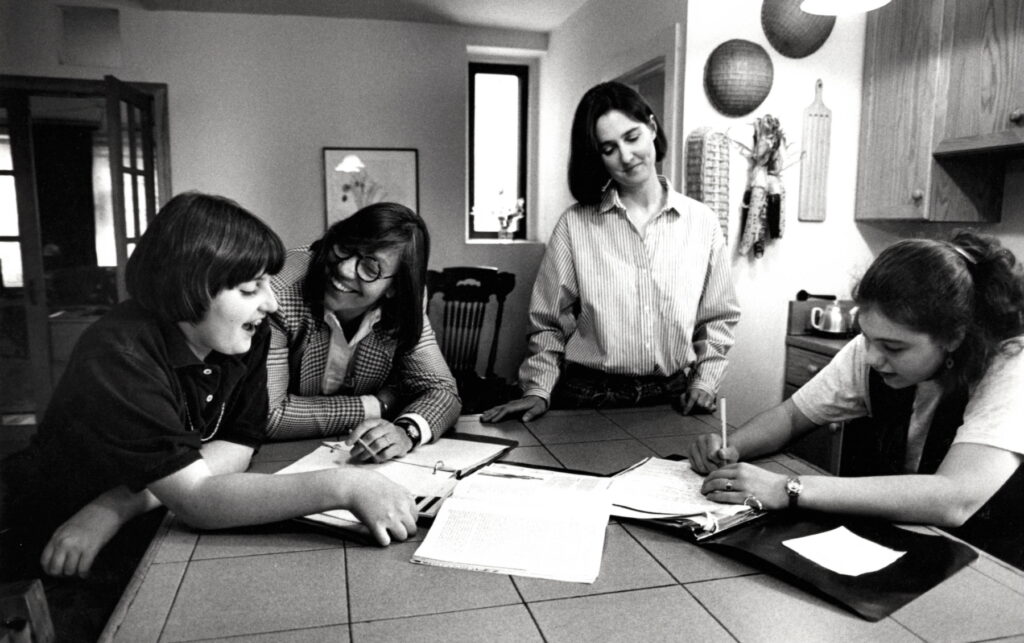Two women should be able to have children with the help of a sperm donor, a person who provides genetic material but has “no rights and no responsibilities” in the children’s lives. A sperm donor might agree to said arrangement without fully understanding its emotional cost, and later have a change of heart. Those two situations can co-exist, even as they set the stage for tragedy.
That’s the story director Ry Russo-Young tells in HBO docuseries “Nuclear Family” — and it happens to be her own. The “Sun Is Also a Star” and “Before I Fall” filmmaker grew up in a lesbian family: her mothers Sandy Russo (who goes by “Russo”) and Robin Young raised her; Robin gave birth to her; and Tom Steel, a friend of a friend, donated his sperm. Another man served as the sperm donor for Ry’s older sister, Cade, whom Russo gave birth to.
For the first few years of Ry’s life, things went according to plan. Tom, a gay man who lived on the other side of the country, stayed out of the picture and Russo, Robin, Ry, and Cade were their own happy nuclear family in New York. But then, around kindergarten age, the girls started asking about where they came from, who their fathers were. So Russo and Robin introduced them to the “men who helped make them.” Ry would see Tom a few times a year and they grew close. He started to consider himself Ry’s father and demand more time with her, while Ry’s mothers began to worry.
Eventually, Tom sued for paternity. Since Russo and Robin were among the first wave of gay couples who started their own families in the ’70s, there was little legal precedent for the case. Plus, the fact that this family court suit didn’t involve a heterosexual couple — which was pretty much unheard of in the early ’90s, when the case took place — led to a lot of press attention.
In its three parts, “Nuclear Family” traces the lawsuit’s buildup, events, and aftermath. The case is a matter of public record, so you can look up its ins and outs whenever you like. This docuseries, however, unpacks what the legal decisions and press stories could not: nuance and context. Russo and Robin did not want to co-parent with their sperm donor; they knew that from the beginning. But when they decided to pursue parenthood, they couldn’t pick an anonymous donor from a catalogue; those options weren’t readily available in the ’70s. (Even if they were, it’s doubtful lesbian women would have had access to them.) As for Tom, he was a gay man living in San Francisco during the height of the AIDS crisis. Perhaps being surrounded by so much loss, death, and uncertainty made him think about the important things in his life — Ry included. No matter his motivation, he did use homophobic and patriarchal legal precedent to bolster his case. Meanwhile, the suit took a severe mental and emotional toll on all the Russo-Youngs, Ry especially.
There was no possible ending to the paternity suit that would leave every party involved — Russo and Robin, Ry, her sister, and Tom — happy and satisfied. It’s clear from the get-go that someone’s heart would break. In that way, watching “Nuclear Family” is like watching a slow-motion car crash. Yet it’s also a warm tribute to family in all its forms, and an implicit call for better legal protections and social options for the LGBTQ+ community.
For me, there was never any doubt that Tom loved Ry, and considered her his daughter — but that wasn’t what he signed up for. I had great sympathy for him throughout “Nuclear Family,” yet I had even more so for the women who wanted a family on their own terms and fought for it with everything they had.
“Nuclear Family” premieres Sunday, September 26, at 10 p.m. EST on HBO and HBO Max.
https://www.youtube.com/watch?v=toqXM0EJ4hY







